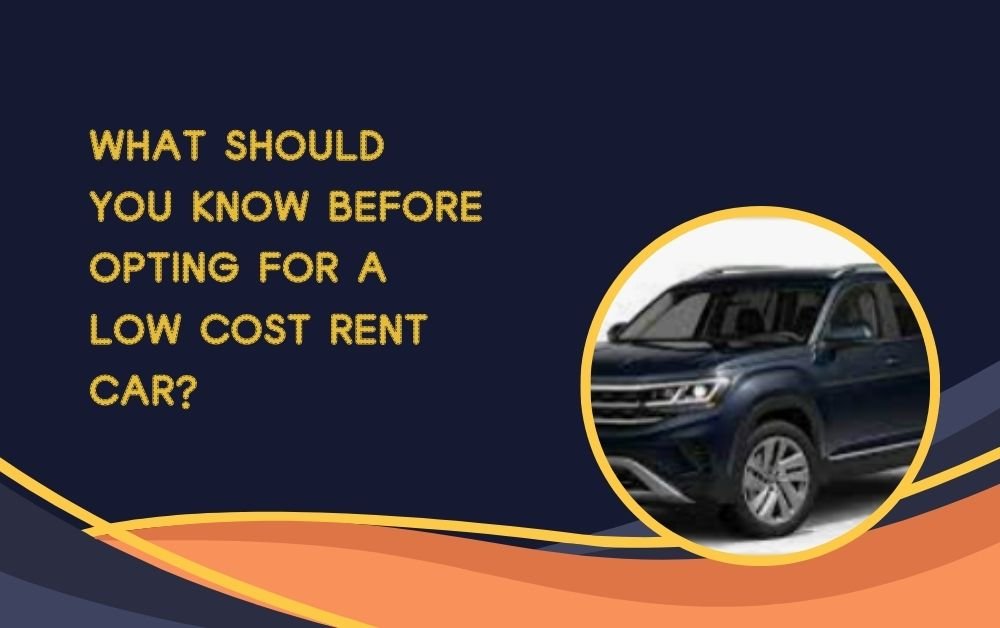Renting a car is a great way to gain freedom and flexibility during your travels, whether you’re on a business trip or exploring new destinations. However, if you’re on a budget, opting for a low-cost rental car can seem like an attractive choice. While these deals can save you money, there are several important factors to consider before making your reservation. Cheap rental cars often come with certain trade-offs, and understanding these will help you avoid unexpected expenses or complications. In this blog, we’ll guide you through what you should know before opting for a low-cost rent car to ensure you get the best value for your money.
1. Understand the Full Cost
Beware of Hidden Fees
One of the most important things to keep in mind when opting for a low-cost rental car is that the price you see advertised isn’t always the price you end up paying. Many low-cost rental car companies add hidden fees that can significantly increase the total cost of your rental. These hidden charges may include:
- Taxes and surcharges: Often not included in the advertised rate and added at the time of payment.
- Airport pick-up fees: Extra charges for picking up or dropping off a car at the airport.
- Late return fees: Charges for returning the vehicle even slightly after the scheduled time.
Always read the fine print and ask for a detailed breakdown of the total cost before confirming your reservation to avoid surprises.
Understand the Fuel Policy
Car rental companies typically offer different fuel policies, and this can impact the overall cost. The most common options include:
- Full-to-Full: You pick up the car with a full tank and are expected to return it with a full tank. This option is usually the most cost-effective if you fill up the tank yourself before returning the car.
- Prepaid Fuel: The company charges you for a full tank of fuel upfront, allowing you to return the car with any level of fuel. This can be more convenient but is generally more expensive, as rental companies often charge higher rates for fuel.
Before choosing a low-cost rental, confirm which fuel policy is in place and consider which one is best for your needs and budget.
2. Check Insurance Coverage
Do You Need Additional Insurance?
Insurance is one area where low-cost car rentals can appear cheap upfront but become expensive if you’re not careful. Most rental companies will offer you several types of insurance options, including:
- Collision Damage Waiver (CDW): This reduces your financial responsibility if the car is damaged in an accident.
- Liability Insurance: Covers damage you might cause to other people or property.
- Personal Accident Insurance: Provides coverage for medical costs if you’re injured in an accident.
While basic insurance might be included in your rental fee, additional coverage is often offered at an extra cost. To avoid paying for unnecessary insurance, check if your personal car insurance or credit card covers rental cars. Many credit cards provide coverage for rental vehicles, which can save you money on rental company insurance policies.
3. Consider the Car Type and Size
Is a Smaller Car Right for You?
Low-cost rentals typically offer smaller, economy cars, which are more fuel-efficient and budget-friendly. However, while these cars may be the cheapest option, they might not suit every traveler’s needs. Consider the following:
- Luggage space: Smaller cars often have limited trunk space, so if you’re traveling with large suitcases or a lot of gear, you might need a larger vehicle.
- Passenger comfort: If you’re traveling with multiple passengers or children, ensure that the car will comfortably fit everyone.
- Road conditions: For trips involving off-road driving or long distances, you may want to opt for a more robust car with better suspension and higher clearance, even if it costs slightly more.
Features and Extras
Low-cost rental cars often come with fewer features than premium rentals. If you require certain amenities, such as air conditioning, GPS navigation, or Bluetooth connectivity, you should check whether these are included or available as paid add-ons. While you may be able to live without some of these features, having them can make your trip more comfortable and enjoyable.
4. Understand Mileage Restrictions
Unlimited vs. Limited Mileage
When renting a car, it’s important to know whether the rental includes unlimited mileage or has a cap on the number of miles you can drive. Many low-cost rental car deals offer limited mileage, meaning you’ll be charged extra if you exceed the allotted distance. This can quickly increase the overall cost if you plan to drive long distances during your trip. If you’re not sure how far you’ll be traveling, it’s often worth paying a bit more for a rental with unlimited mileage.
5. Check the Car’s Condition Before Driving Off
Inspect the Vehicle Thoroughly
Before leaving the rental lot, take a few minutes to thoroughly inspect the car for any damage. Low-cost rental cars may have been rented many times before, and some minor damage might have gone unnoticed by the rental company. Make sure to:
- Check for dents, scratches, and other visible damage: Take photos of any damage you notice and report it to the rental company before driving off.
- Inspect the tires and windshield: Ensure the tires are properly inflated and there are no cracks in the windshield.
- Test the lights and brakes: Check that all lights and brakes are functioning correctly.
By documenting the car’s condition, you can avoid being held responsible for any pre-existing damage when you return the vehicle.
6. Factor in the Rental Location

Choose the Right Pick-Up and Drop-Off Location
Car rental prices can vary significantly depending on where you pick up and drop off the vehicle. Renting from an airport location, for example, can be more expensive due to additional surcharges. If possible, consider picking up your rental car from a city location to save money. Additionally, returning the car to the same location where you picked it up is usually cheaper than opting for one-way rentals.
7. Book Early to Get the Best Rates
Take Advantage of Early Booking Discounts
The earlier you book your rental car, the more likely you are to get a better deal. Car rental companies often offer discounts for early bookings, and availability tends to be higher. Booking last minute can limit your options and may lead to higher prices, especially during peak travel seasons. By planning ahead, you can secure a low-cost rental that fits your needs without compromising on quality.
Conclusion
Opting for a low-cost rental car can be an excellent way to save money, but it’s essential to be aware of the potential trade-offs and additional costs. By understanding the full cost of the rental, checking insurance coverage, and considering the type of vehicle and any mileage limits, you can avoid unexpected expenses and make the most of your rental. Additionally, taking the time to inspect the car before driving off and choosing the right pick-up location can help ensure a smooth rental experience. With these tips in mind, you can confidently choose a budget-friendly car rental that meets your travel needs without breaking the bank.
Note:- To read more articles visit empireadda.



